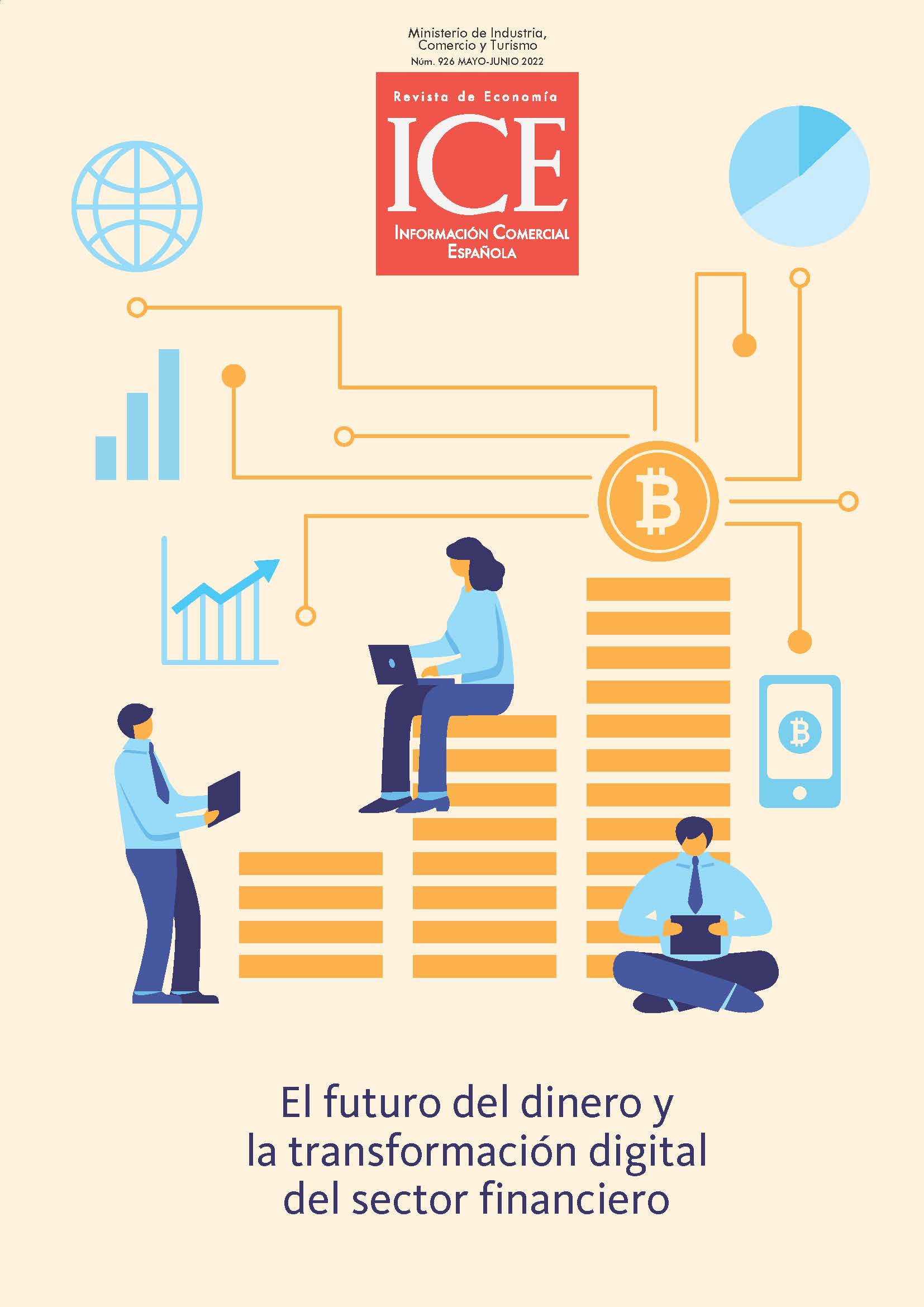La entrada de las bigtech en el negocio bancario: un análisis coste-beneficio
##plugins.themes.bootstrap3.article.sidebar##
Descargas
##plugins.themes.bootstrap3.article.main##
La entrada de las bigtech puede transformar el negocio bancario de manera radical, en especial, los mercados de pagos y de crédito al consumo y a pymes. Aunque es de esperar que dicha entrada estimule la competencia en beneficio de los clientes de la banca minorista, también puede dar lugar a mercados crediticios aún más concentrados y aumentar la inestabilidad financiera. Que el resultado neto para la economía y, en particular, para los consumidores y las empresas sea positivo dependerá en buena medida de la actuación de reguladores y autoridades de competencia.
##plugins.themes.bootstrap3.article.details##
Acquisti, A., John, L. K., & Loewenstein, G. (2013). What Is Privacy Worth? The Journal of Legal Studies, 42(2), 249-274.
Armstrong, M. (2006). Competition in Two-sided Markets. The Rand Journal of Economics, 37(3), 668-691.
Bazot, G. (2014). Financial consumption and the cost of finance: measuring financial efficiency in Europe (1950-2007) (Working Paper No. 2014-17). Paris School of Economics.
Belleflamme, P., & Peitz, M. (2015). Industrial Organization: Markets and Strategies, 2nd Edition. Cambridge University Press.
Belleflamme, P., & Peitz, M. (2017). Platform Competition: Who Benefits from Multihoming? (Working Paper No. 17-05). University of Mannheim.
Bergemann, D., & Bonatti, A. (2019). The Economics of Social Data: An Introduction (Discussion Paper No. 2171R). Cowles Foundation for Research in Economics Yale University.
Buchak, G., Matvos, G., Piskorski, T., & Seru, A. (2017). Fintech, Regulatory Arbitrage, and the Rise of Shadow Banks (NBER Working Paper No. 23288). National Bureau of Economic Research.
Carney, M. (2017). The Promise of Fin Tech – Something New Under the Sun? Deutsche Bundesbank G20 Conference on “Digitizing finance, financial inclusion and financial literacy”. Wiesbaden.
Choi, J. P., Jeon, D.-S., & Kim, B.-C. (2019). Privacy and Personal Data Collection with Information Externalities. Journal of Public Economics, 173, 113-124.
Condorelli, D., & Padilla, J. (2020). Harnessing Platform Envelopment in the Digital World. Journal of Competition Law & Economics, 16(2), 143-187.
Croxson, K., Frost, J., Gambacorta, L., & Valletti, T. (2022). Platform-based business models and financial inclusion (BIS Working Papers No. 986). Bank for International Settlements.
De la Mano, M., & Padilla, J. (2018). Big Tech Banking. Journal of Competition Law & Economics, 14(4), 494-526.
Duarte, J., Siegel, S., & Young, L. (2012). Trust and Credit: The Role of Appearance in Peer-to-peer Lending. Review of Financial Studies, 25(8), 2455-2484.
EBA, European Banking Authority. (2021). Report on the Use of Digital Platforms in the EU Banking and Payments Sector. EBA/REP/2021/26.
Eisenmann, T., Parker, G., & Van Alstyne, M. (2011). Platform Envelopment. Strategic Management Journal, 32(12), 1270-1285.
EY. (2018). The revised Payment Services Directive. (PSD2).
Feyen, E., Frost, J., Gambacorta, L., Natarajan, H., & Saal, M. (2021). Fintech and the digital transformation of financial services: implications for market structure and public policy (BIS Papers No. 117). Bank for International Settlements.
Frost, J., Gambacorta, L., Huang, Y., Shin, H. S., & Zbinden, P. (2019). Big Tech and the changing structure of financial intermediation. Economic Policy, 34(100), 761-799.
FSB, Financial Stability Board. (2022). FinTech and Market Structure in the COVID-19 Pandemic. Implications for financial stability.
Grossklags, J., & Acquisti, A. (2007). When 25 cents are too much: An experiment on willingness-to-sell and willingness-to-protect personal information. In Workshop on Economics of Information Security (WEIS). Pittsburgh.
Hagiu, A., & Wright, J. (2015). Multisided platforms. International Journal of Industrial Organization, 43, 162-174.
IIF, Institute of International Finance. (2018). Reciprocity in Customer Data Sharing Frameworks.
Iyer, R., Khwaja, A. I., Luttmer, E. F. P., & Shue, K. (2015). Screening Peers Softly: Inferring the Quality of Small Borrowers. Management Science, 62(6), 1554-1577.
Jagtiani, J., & Lemieux, C. (2017). Fintech Lending, Risk Pricing and Alternative Information (Federal Reserve Board of Philadelphia Working Paper No. 17-17).
Jai, T. M. C., & King, N. J. (2016). Privacy versus Reward: Do Loyalty Programs Increase Consumers’ Willingness to Share Personal Information with Third-Party Advertisers and Data Brokers? Journal of Retailing and Consumer Services, 28, 296-303.
Jiménez, G., Lopez, J. A., & Saurina, J. (2013). How does competition affect bank risk-taking? Journal of Financial Stability, 9(2), 185-195.
Liberti, J. M., & Petersen, M. A. (2018). Information: Hard and Soft (NBER Working Papers No. 25075). National Bureau of Economic Research.
McKinsey & Company. (2017). Remaking the bank for an ecosystem world.
McKinsey & Company. (2018). New rules for an old game: Banks in the changing world of financial intermediation.
Moody’s. (2018). Big Tech – a real threat to financial firms in retail services.
Padilla, J. (2021). Big Tech Banks, Financial Stability and Regulation. Revista de Estabilidad Financiera, 38, 11-26.
Padilla, J., & Trento, S. (2019). No Barbarians at the Gate? The Relatively Slow Progress of Big Techs in EU and US retail banking. Concurrences, 4, 42-47.
Philippon, T. (2015). Has the US Finance Industry Become Less Efficient? On the Theory and Measurement of Financial Intermediation. American Economic Review, 105(4), 1408-1438.
Philippon, T. (2018). The FinTech Opportunity (Working Paper). New York University, Stern School of Business.
Regner, T., & Riener, G. (2017). Privacy is Precious: On the Attempt to Lift Anonymity on the Internet to Increase Revenue. Journal of Economics and Management Strategy, 26(2), 318-336.
Restoy, F. (2021). Fintech regulation: achieving a level playing field (FSI Occasional Paper No. 17). Financial Stability Institute.
Thakor, R. T., & Merton, R. C. (2018). Trust in Lending (NBER Working Paper No. 24778). National Bureau of Economic Research.
Turow, J., Hennessy, M., & Draper, N. A. (2015). The Trade-off Fallacy – How Marketers Are Misrepresenting American Consumers and Opening Them up to Exploitation. University of Pennsylvania - Annenberg School for Communication.
UK Competition & Markets Authority. (2016). Making Banks Work Harder for You.
Vives, X. (2016). Competition and Stability in Banking: The Role of Regulation and Competition Policy. Princeton University Press.
WEF, World Economic Forum. (2017). Beyond FinTech: A Pragmatic Assessment of Disruptive Potential in Financial Services.


